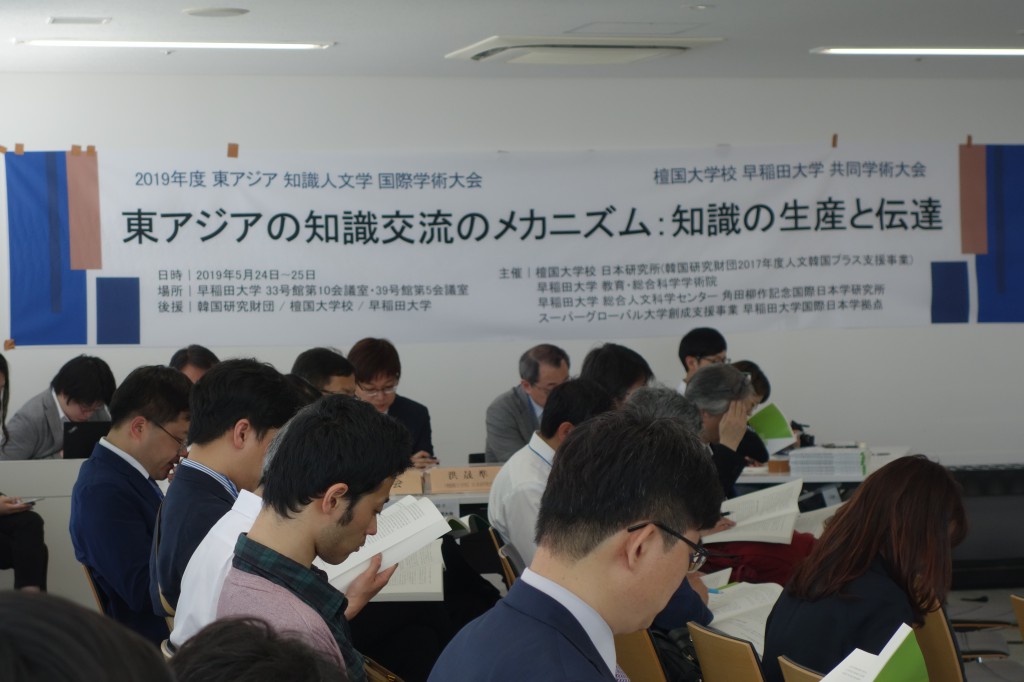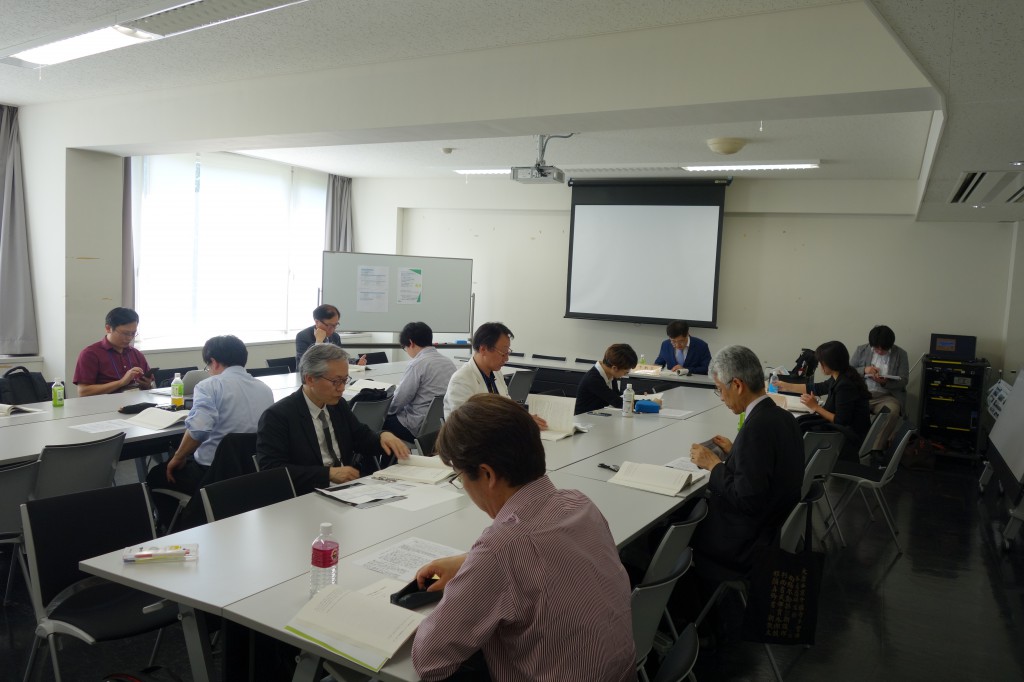Academic Year 2019 International Academic Conference on Knowledge and the Humanities
Joint Academic Conference Between Dankook University and Waseda University
“The Mechanisms of Exchanging Knowledge in East Asia: The Creation and Transmission of Knowledge”
On the two days of May 24 and 25, 2019, an international academic conference took place at Waseda University’s Toyama Campus.
Since the 2017 academic year, the Institute of Japanese Studies at Dankook University, South Korea has been working on the research subject of “The Transition of Knowledge Power and East Asian Humanities: Con-Divergence of Korea-China-Japan Knowledge Production and Distribution” as a project that is part of the Humanities Korea Plus (HK+) program.
The international academic conference was held by the Institute of Japanese Studies at Dankook University, along with Waseda University’s Faculty of Education and Integrated Arts and Sciences, the Waseda University Research Institute for Letters, Arts and Sciences, the Ryusaku Tsunoda Center of Japanese Culture, and the Waseda University Global Japanese Studies Model Unit of the Top Global University Project. The title of the conference was “The Mechanisms of Exchanging Knowledge in East Asia: The Creation and Transmission of Knowledge.”
On the morning of the first day of the conference, following the opening ceremony, Lee Sung-si (Faculty of Letters, Arts and Sciences, Waseda University) gave the keynote lecture. The title of the keynote was “A Perspective on the Circulation of Knowledge in East Asia: With Emphases on the Dissemination and Acceptance of National Histories.”
As an example of the conference’s research topic of “the exchange of knowledge in East Asia,” Lee discussed the issue of the dissemination and acceptance of western scholarship in early modern East Asia through the “intermediary” of Japan. Lee explained the degree to which the coming into being of a “national history” in what is now the Republic of Korea (South Korea) and the Democratic People’s Republic of Korea (North Korea) is due to those who, during the period of colonization, came from Korea to Japan to study. As he did so, he made keen observations about points at issue concerning the dissemination and acceptance of this national history through the “intermediaries” of these students studying abroad and concerning how this national history is evaluated today. In particular, Lee described the influence of Sokichi Tsuda’s national history and national thought, including various specific examples, as a framework for understanding national histories and ethnic cultures.
During the latter half of the lecture, Lee discussed mokkan (wooden strips used for writing before paper was in wide use) excavated in South Korea as an ancient example for understanding the issue of “intermediaries” in the dissemination and acceptance of culture from a more macroscopic perspective. The use of mokkan in the Japanese archipelago began around the early seventh century and did not overlap with their use in China (which lasted until around the fourth century). Therefore, Lee explained, it was long thought that Japanese mokkan had been created independently within the archipelago. However, despite there only being fewer than a thousand mokkan excavated in South Korea, there are matches for nearly all the various kinds of mokkan that have been excavated in Japan. Lee explained that this fact makes it possible that Japan’s cultural practice of using Chinese character gained acceptance via the “intermediaries” of the peninsular kingdoms of Silla and Baekje. Following on, at the end of his lecture, Lee presented a strong argument for positively evaluating the “creative acceptance of intermediaries.”
Next, during the afternoons of the first and second days, a total of 20 researchers split among two venues presented research concerning the mechanisms of the exchange of knowledge in East Asia. The presentations were given by nine researchers from Dankook University’s Institute of Japanese Studies; one each from Rikkyo University, Xi’an Jiaotong University in China, National Chengchi University in Taiwan, and Hán Nôm Institute in Vietnam; four from Waseda University’s Faculty of Education and Integrated Arts and Sciences; and three from Waseda University’s Faculty of Letters, Arts and Sciences. At each grouping of presenters there were also general discussions, moderated by either Heo Jaeyeong, the Director of Dankook University’s Institute of Japanese Studies, or Jeong Hyeong, the chair of the Institute’s steering committee. The themes discussed in the research presentations covered considerable ground, including thought, language, literature, history, folklore, education, and research throughout various regions of East Asia and during various periods. In the general discussion sessions, there were lively talks, spanning the different speakers’ areas of specialty, about the ways in which knowledge arises, is communicated, and then exchanged more broadly throughout the East Asian region.
The international academic conference concluded with a closing ceremony, a rousing success.

International Academic Conference Overview:
Title:
Academic Year 2019 International Academic Conference on Knowledge and the Humanities
Joint Academic Conference between Dankook University and Waseda University
“The Transition of Knowledge Power and East Asian Humanities: Con-Divergence of Korea-China-Japan Knowledge Production and Distribution”
Event dates: May 24 (Fri.) and 25 (Sat.), 2019
Schedule:
Keynote Lecture: May 24 – 11:00 am to 11:50 am
Research Presentations:
May 24
First and Second Groups of Presentations: 1:20 pm to 2:40
Third and Fourth Groups of Presentations: 3:00 pm to 4:20 pm
May 25
Fifth and Sixth Groups of Presentations: 1:00 pm to 2:40 pm
Venue: Meeting Room 10, 16th floor of Building 33 & Meeting Room 5, 5th floor of Building 39, Toyama Campus, Waseda University
Speakers:
・Keynote Lecture:
Faculty of Letters, Arts and Sciences, Waseda University
Lee Sung-si
・Research Presentations:
Institute of Japanese Studies, Dankook University, South Korea
Lee Byeongmin
Kim Gyeongnam
Kim Changsu
Kim Sejong
Choe Seungeun
Choe Seokwon
Hong Seongjun
Maeng Yeongil
Yun Jiwon
Rikkyo University
Kim Gwangsik
Xi’an Jiaotong University, China
Koichiro Haraguchi
National Chengchi University, Taiwan
Park Byeongseon
Hán Nôm Institute, Vietnam
Nguyen Tuan Cuong
Faculty of Education and Integrated Arts and Sciences, Waseda University
Chiaki Ishihara
Kang Yuni
Makoto Hori
Atsuhiko Wada
Faculty of Letters, Arts and Sciences, Waseda University
Kimiko Kono
Hidenori Jinno
Hisao Takamatsu




